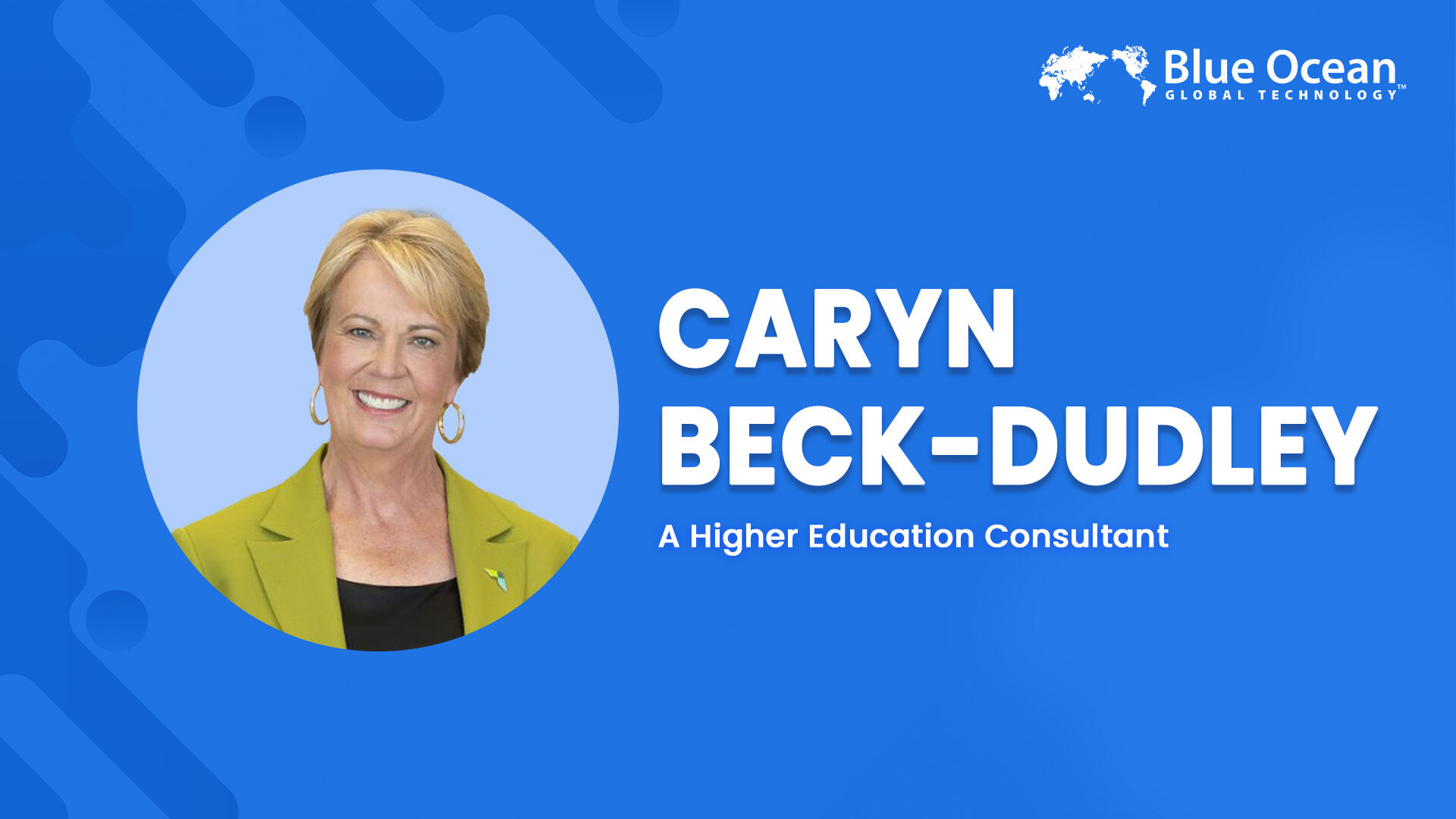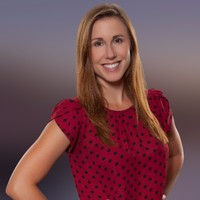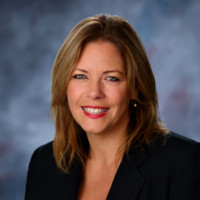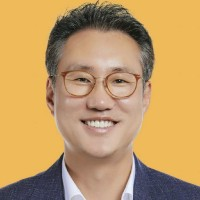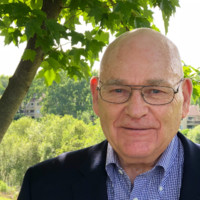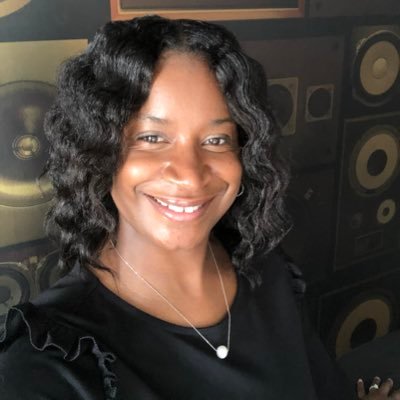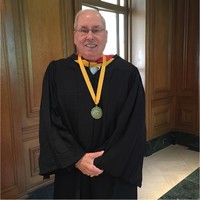About Caryn Beck-Dudley
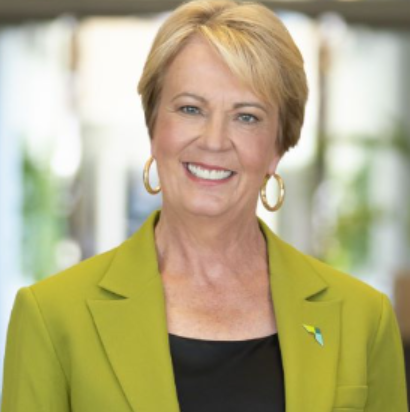
Caryn Beck-Dudley is a higher education consultant with over 40 years of experience in academic leadership. She has been Dean of Colleges of Business at Utah State University, Florida State University, and Santa Clara University. Caryn then served as CEO of AACSB International, a global accrediting body for business schools. She retired from AACSB to pursue consulting, applying her experience and expertise in assisting educational institutions through industry challenges. Outside of work, Caryn enjoys fly fishing, hiking, reading and traveling.
Blue Ocean: Tell us about your professional journey and what led you to become a Higher Education Consultant. What inspired your transition from CEO of AACSB International to consulting in the education sector?
Caryn: It all began when I retired, but the story really starts when I was an undergraduate in college. I met my late husband, and at the time, he was accepted into a PhD program. We decided to get married, and since there was a law school within nine miles of where he was studying, I decided to go to law school. This was back in 1980. We moved to the Panhandle of the United States, in northern Idaho, where he attended Washington State University, and I enrolled at the University of Idaho’s law school. I didn’t actually think I was going to be a lawyer—I just liked politics, but law seemed like a good fit at the time since it was available in the geographic area where we were living. I liked my constitutional law classes as an undergraduate but had no family background in law.
After law school, I started practicing in Salt Lake City with a large law firm. My late husband, however, took a job with the federal government, which he hated. He had always wanted to be a professor—likethe professor from Gilligan’s Island, a sitcom from the 1960s. He was a soil chemist, and he eventually took a faculty position at Utah State University in Logan, Utah, which is about 90 miles from Salt Lake City. We decided to live in the middle of the two cities and split the travel difference. I was going to continue practicing law, but there was an ad in the classified section of the local newspaper for a temporary business law professor at Utah State University, as a faculty member had quit without giving any notice. I decided to apply for the position, figuring I would be able to quit my law firm job as a relatively new junior associate. I was given the position and did in fact quit my law firm position.. At 26, I took the role, teaching a class of 250 students, another of 80, and a third of 40—despite having just three weeks to prepare. But I loved it. At the law firm I worked under senior partners and did not have my own clients so leaving didn’t leave it in a bind. I quickly realized I enjoyed teaching. Logan Utah didn’t have a law firm that handled very much commercial work, so I applied for the permanent faculty position which I received. From there, I fell in love with higher education. It was fun, dynamic, and intellectually stimulating, and I got to interact with incredibly bright students.
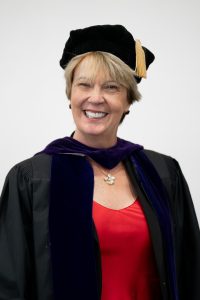
Graduation is always the best time
I worked my way up through the faculty ranks at Utah State, eventually becoming a full professor—one of the few women in that position at the time. Later, I was appointed as the department head, and then I became the dean. The faculty wanted me to apply for the dean’s position, even though I wasn’t initially sure I was qualified for leadership roles. I applied and, after being appointed, I found that I really enjoyed this different role. I spent four years as dean at Utah State, then moved on to Florida State University, where I became dean for nine and a half years.
During this time, my husband passed away from brain cancer, and I faced the challenge of managing both work and personal loss. My daughter was preparing to pursue a PhD at the University of California at Riverside, and my son was making commercials in Los Angeles. Although Tallahassee was a great city, it was a bit isolated, requiring long travel times. Eventually, a search firm reached out about a position at Santa Clara University in California. At first, I didn’t think it would be a good fit—it was a small, private school, and the cost of living in Silicon Valley was high. However, after visiting, I found that I liked the school and the opportunity it offered. Santa Clara’s location in the heart of Silicon Valley provided an exciting environment, with alumni in high positions at tech companies like Meta (formerly Facebook) and Google. I spent five years there, and by that time, my daughter had graduated, my son had moved forward in his life, and my father had passed away.
At that point, I decided I was ready for a change and no longer wanted to be a dean. I had spent almost40 years in high-level academic positions, and the thought of something different appealed to me. AACSB, the global accreditor of business schools, contacted me with a potential opportunity. The position was located back in Florida but this time in Tampa and there were offices in Singapore and Amsterdam.I agreed to take on the role, which should have involved a lot of travel. However, the pandemic hit at the same time and everything changed.I worked remotely from my townhouse in Tampa for the next two years. I agreed to a three year contract at AACSB, and when that time was coming to an end, I was asked to stay longer. However, after 40 years of working in high-level roles, I was ready to retire and have a free calendar.
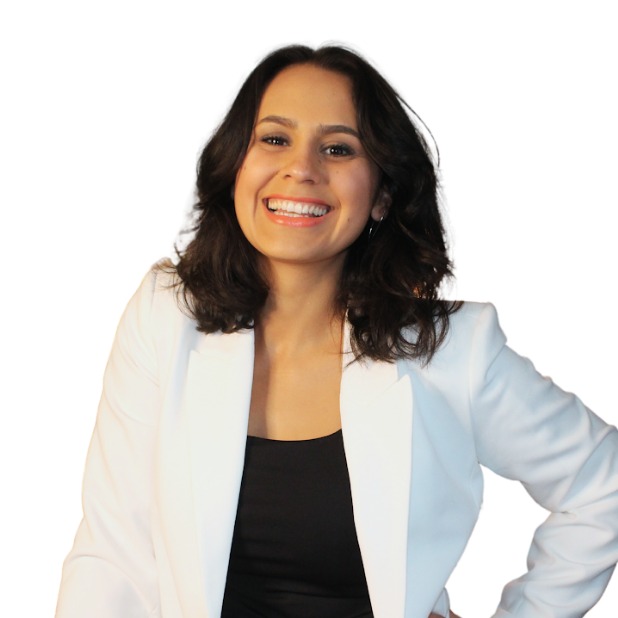
Blue Ocean: With your extensive background in higher education leadership, particularly with AACSB International, how do you approach the challenges facing universities today? Were there any pivotal experiences during your time at AACSB that shaped your perspective?
Caryn: At AACSB, I was responsible for the accreditation of business schools globally, which gave me a unique perspective on higher education beyond a single institution. I was the first CEO of AACSB who had been both a faculty member and a dean, as well as an administrator within higher education. This background helped me see how rapidly higher education is changing and recognize the distinct challenges faced by institutions in different parts of the world. AACSB had a strong U.S. foundation, but what worked in the U.S. didn’t always translate well to places like South Africa, India, China, or Australia. Each region has unique needs within its educational system, and my experience in higher education helped me understand what business schools are going through.
A significant part of my role at AACSB, and one of my main passions, was to ensure business schools served as agents of positive social change. Before stepping in as CEO, I was chair of the board, where we revised the accreditation standards to focus less on technical requirements and more on the real-world impact of educational programs. We asked: is this effort making a positive social difference? If not, why are we dedicating resources to it? That was my passion during my three years at AACSB.
Blue Ocean: What recent trends in higher education do you find most impactful, and how do you foresee these trends evolving in the coming years?
Caryn: One of the biggest trends is enrollment trends. The impact of enrollment trends varies regionally. In the United States, enrollment among traditional college-age students (18–22) is on the decline, while in sub-Saharan Africa, enrollment is rising, and in India, it has leveled off a bit. China still sees growth, though that could change. This raises the question: is higher education meant just for young adults, or should it be a lifelong journey where individuals continuously return to learn new skills? Given how fast things evolve today, I strongly believe in the latter. Education isn’t “one and done.” People will need to return to learning multiple times throughout their lives.
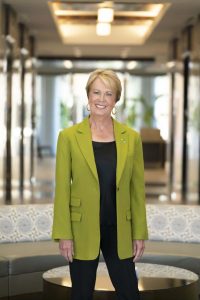
Caryn Beck-Dudley
Another significant trend is the rising cost of higher education. In the United States, students largely bear the cost, while in many other countries, higher education is more publicly funded. In the United States, what used to be seen as an investment is now viewed as a heavy financial burden. Balancing cost with quality is a universal challenge, and finding ways to make higher education affordable without sacrificing standards is crucial.
The third major trend is the shift to online and flexible learning formats. Historically, the academic calendar in the U.S. is based on an agricultural cycle, which is outdated. Why do we need 16-week semesters or 50-minute classes? The pandemic forced a rapid shift to remote learning, and I expected that we might retain some of those innovations. However, institutions largely returned to traditional models instead of adopting a more flexible structure that might be better suited to the demands of today’s world. Going forward, I think these are the main challenges: redefining the timing and structure of education, balancing affordability with quality, and expanding learning opportunities beyond a specific age range to support lifelong learning.
Blue Ocean: As a consultant, what does a typical day look like for you now compared to your time leading AACSB International?
Caryn: My typical day is wonderful because I wake up in the morning and decide what I’m going to do. I keep very little on my calendar. I am always open to looking at great opportunities but they need to fit into my personal life. In contrast, my typical day at AACSB was not flexible at all. Since we had offices in Singapore, an employee in China, and colleagues in South Africa and Europe, my calendar often began as early as 2:00 a.m. to accommodate back-to-back meetings across time zones. After Covid ended, there was also a lot of travel, and I would frequently make two or three presentations a week.
Being retired is great. Now I get up, read books, read the newspaper, and call my kids. I also FaceTime my two-and-a-half-year-old grandchild. My partner and I also get to travel to wherever we want to go—We are currently in the Florida Keys.
Blue Ocean: With your experience as a CEO and higher education consultant, what unique strategies or insights do you offer your clients that set you apart from other consultants in this field?
Caryn: My strength is not only my versatility but also that I’m well-read. I pay attention to trends—not necessarily just in higher education. I read widely because you never know where a great idea might come from or where you might find something useful to borrow from another field.
Another is that I say yes to a lot of things and figure them out later. I am confident that I can do the job. It would take a very difficult job that I’m not interested in or a major timing issue for me to say no. Throughout my career, I’ve usually said yes—even when I didn’t know exactly what the role entailed. I didn’t know what a dean did, but I said yes to being a dean. I didn’t fully understand what it meant to be a faculty member—I’d been a student and knew faculty members, but I hadn’t been one, and my parents weren’t faculty members either. But I said yes, learned from others, and figured it out.
I also have great connections all over the world. I’ve been very honored to meet some of the best people in higher education, and all of them will pick up my call. I consider myself generous with my time, and people reciprocate. So what I offer is my access as well.
Blue Ocean: Reflecting on your extensive career, what has been the key to your success in managing leadership roles in education, and how do you stay ahead in such a dynamic sector?
Caryn: I think one of my strengths has been the ability to find and nurture talent. A lot of people I’ve hired as department chairs are now deans at other universities. I seem to have a knack for recognizing someone who will excel, even when they may not see it themselves, and then I ensure they have the tools they need to succeed. I’m also someone who doesn’t “shoot the messenger.” Many leaders struggle with receiving bad news objectively, but I believe my openness has helped me retain valuable talent. If there’s no further room for growth in my organization, I encourage people to explore opportunities elsewhere, helping them continue advancing even if it means moving on.
When it comes to managing people, I’m demanding but fair. My colleagues would probably agree that I have high standards; if someone isn’t the right fit, we address it directly. I also stay honest with my team about their strengths and areas for improvement.
As for staying ahead in the sector, I rely on my network. I’m always learning by reaching out to real experts. If I’m unclear about something or need insight, I usually know someone or can connect with someone who does. I intentionally connect with new people from diverse fields, as it keeps my perspective fresh. For example, I met Sameer Somal at a conference, and his work intrigued me. He wasn’t in my original network, but I appreciate connecting with people like him who are innovative and come from different areas.
For my students and my own children, I emphasize that your network can never be too large. In Silicon Valley, for example, everyone seems to know everyone else through past roles, projects, or shared connections. Those relationships are invaluable; you might do a job for someone, and then move on, but they’ll remember you and reach out when the right opportunity comes around.
Blue Ocean: Reflecting on your journey, what advice would you give to your younger self when you first entered this field?
Caryn: Two things were really hard for me to understand. The first was the difference between being efficient and being effective. I have a short story about that: my daughter was four or five, and because I was so busy—my husband was also a faculty member—we had two kids with all their events, and we kept a big calendar with everything on it to keep track of meetings, work, and activities. One evening, around 4:30, she came in and asked if she could have a sleepover at a friend’s house.
I told her no because it wasn’t on the calendar, and she started to cry, which she didn’t often do. My husband looked at me and said, “You’ve got to be kidding.” I responded that it wasn’t on the calendar, and he pointed out that it didn’t matter; we had the time, so she could go. I was being an efficient mother, but I wasn’t being an effective one. From then on, I tried to prioritize effectiveness over efficiency, though it took me a long time—about 11 years into my career—to really get that lesson.
The second thing is that for a long time, I was focused on being perfect, getting everything done perfectly, and maybe that’s more common among women. My male counterparts never seemed to worry about that. I hesitate to tell women they don’t need to be perfect because I’m sure my dedication to doing excellent work contributed to my success. But, boy, it was stressful. There were times when things didn’t have to be perfect, especially outside of work. Not everything in life requires perfection. The dishes don’t need to be washed right away; the world won’t end if I don’t vacuum. I wish I’d breathed a little deeper and not been so intense. I was a full professor by 35 or 36—a fast track that suited me, but maybe it didn’t have to be that fast.
Blue Ocean: What hobbies or interests do you pursue outside work, and how do they help you maintain a balanced lifestyle?
Caryn: I used to have lots of hobbies, but when you retire, you realize your hobby was working. I had children, and there is only so much time in a day, so you have to pick and choose how to spend it. I like to travel and fly fish, but not ocean fishing because I get seasick. I enjoy fly fishing in streams, though I don’t get to do it as much as I’d like. I also love to hike and especially love mountains. I grew up near mountains, and even though I live in Florida, we have a place in Montana, which is beautiful.
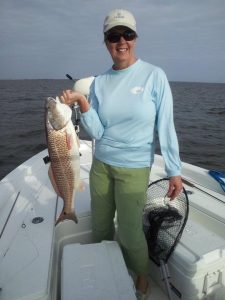
Fly fishing for red fish
I used to ski, but I had my hip redone a couple of years ago. They say I can ski again, but I’m not so sure. Now my hobbies are mostly reading, walking, and trying to get back into fiction. In my job, I only read nonfiction, which probably sounds boring to people who aren’t into it. So, if you have any good fiction books, let me know.
I used to have a ton of hobbies, like dancing but all of that fell away during my working years, and that’s been the hardest thing about retirement. I like to call it building a habit—getting back to the things you love. But it’s hard to start up again, and that’s been my biggest failure so far in retirement.
Blue Ocean: Is there a particular quote or advice that resonates with you and has guided you through your career?
Caryn: Probably a couple. My family was always about having your own money. As a female, make sure that you have your own money so that no matter what happens—like in my case when my husband passed away—you’re financially secure. It’s not just about divorce or separation; having your own money has been important to me. It has allowed me to retire and be financially independent, which gives me a lot of flexibility in what I do.
The second one, on a more personal level, is that there’s no reason not to be kind. You don’t know other people’s struggles, and while that may sound trite, it’s true. I’ve learned this the hard way a couple of times with faculty members I initially thought were being difficult or disrespectful, only to find out they were dealing with serious personal issues they hadn’t felt comfortable sharing with me. That made me feel bad as their boss, realizing they didn’t feel they could come to me with what was going on. So I’ve tried to improve in this area and to show up as my authentic self. I’m not smart enough to have more than one personality, so I aim to be kind and empathetic in all my roles. That doesn’t mean avoiding hard decisions, but there’s no place for being cruel or mean.
Conclusion
Caryn Beck-Dudley’s dedication to promoting positive social change within education highlights the power of education to drive societal impact. Her advice on the importance of lifelong learning, balancing efficiency and effectiveness in everything you do, and prioritizing well-being over perfection offer valuable lessons for the next generation of educators and leaders.
Do you have a personal or professional story that can inspire other people into becoming the best version of themselves?
You are welcome to share your journey with our audience.

